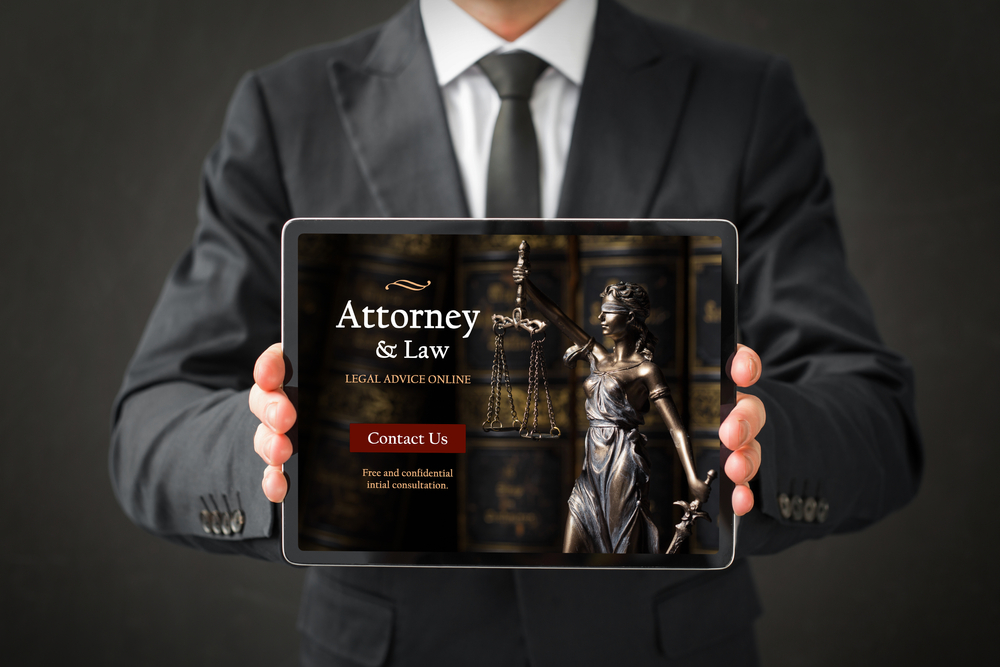A law firm’s website is the face of the business. It’s often the first stop for potential clients and it’s important to make a good impression. The thing is, however, not all legal websites are created equal. So, what does “effective legal website design” mean for a legal website?
There’s a lot that goes into creating an effective legal website. From the layout to the content, there are certain elements that must be included to reach your target audience. In fact, law firms have a unique challenge regarding website design. They need to convey authority and trustworthiness while making sure their site is easy to use.
In this blog post, we’ll go over seven musts for legal website design. By following these tips, you can create a website that is both visually appealing and legally compliant.
Musts for Legal Website Design in 2022
The legal field has seen a large amount of change in recent years, with the internet creating new opportunities and challenges for legal professionals and legal consumers. With this dawn of technology comes legal websites that can better inform clients, connect them to legal support, and allow them to get more involved in their legal matters.
When it comes to designing legal websites, there are certain elements that you should make sure to include. These aspects will help your legal website offer information quickly and efficiently while maintaining its professional image. Here are some tips on what every legal website should have:
1. A Legal Website Must Have a Site Structure That Fits Your Needs & Goals
The first step in legal website design is identifying what you need your site to do. This determines your legal website’s structure style — which pages it will have and how many there will be.
The least complicated legal websites only have a handful of useful pages. For more complex sites with multiple purposes or goals, you may need numerous articles on different subjects within one site that link together online via hyperlinks.
At some point, all legal websites have to have a contact page. The legal site’s home page allows the legal website owner to provide important legal information, brief legal advice on common legal issues, legal forms, legal tips, and legal services included in your legal fees.
The next step in legal website design is to identify your target audience or clients. This will determine how you want the site to look aesthetically — what colors it should use and what images are best suited for your specific online legal website design.
Aesthetics also refer to general appeal — do you want a sleek, simple modern style, or would something more traditional work better?
By doing a thorough job in these steps, you will avoid problems in the future when it comes to how the website functions. If a legal website’s structure does not match its owner’s needs, then it will have a messy appearance for traffic surfing through it. This can be problematic because legal professionals want their legal websites to look appealing to attract more clients or visitors.
2. A Legal Website Must Have a Fast-loading Design
In the legal industry, two factors determine whether or not your legal site is performing to its fullest potential: page speed and mobile presence.
Both of these factors are important in ensuring that your website is helping you out as much as possible, and if they aren’t addressed, then lawyers could be losing out on cases every day!
How does this happen? Well, when it comes to legal practice, many people turn up at court without representation because they feel like their case isn’t “that bad.” With statistics like 10% of legal problems resulting in legal action, you don’t want to be that person representing yourself, because the legal industry becomes a game of roulette.
Page speed is important for legal websites because it could determine whether or not you win your case before proceedings have even begun. How could this happen?
Well, let’s say there are two lawyers with very similar cases and circumstances, but one site has faster load times than the other — which means no matter what happens, they’ll stay ahead because their clients can access crucial information easily. Not only does this mean you’ll lose out on cases if your legal website doesn’t have fast load times, but it also means clients will leave.
3. A Legal Website Must Address User Needs and Questions
If you have a legal website or want to create one, it is important that your legal website addresses user needs and questions. A legal website design must be informative and helpful for website visitors.
In fact, legal websites are created to provide information about legal services and products as well as attract clients if possible. Similarly, legal website design should answer all queries by potential clients to help them make an informed decision.
Legal services provided across the globe vary depending on each country’s legal system. However, many legal terms remain the same no matter what country you live in. For example, everyone knows that “libel” refers to written defamation, whereas “slander” concerns verbal defamation of someone.
In legal website design, legal terms should be defined in simple language. In fact, legal websites must be designed so that visitors can understand legal concepts or terminologies easily.
This is extremely important because legal advice and information provided online are based on the law governing each country. Thus, for example, a legal website created in New York will use legal terms which apply to laws of this state rather than those applied in California.
Legal web designers know that users tend to get lost when legal terms are used without any explanation or option to contact a lawyer for clarification if needed. To avoid such problems, legal website design must include sufficient explanations about legal services offered by lawyers on the page where these services are listed, along with their features and benefits for legal website visitors.
4. A Legal Website Must Be Clean & Up-To-Date With Modern Design for a More Professional Appeal
A legal website is a very important part of legal marketing for attorneys. A legal site serves as the basic tool to establish your legal agency’s online presence and also tells legal consumers who you are and what you do.
With this, your website must be clean and up-to-date with modern design for a more professional appeal. This is because a legal website plays a big role in influencing potential clients, so it needs to convey an accurate image of your legal firm or law office.
What does this mean? It means that when legal consumers see your legal site, they should get the right impression about the kind of services that you offer and whether or not they want to retain your legal representation or seek out other options.
For legal marketers, legal SEO and legal SEM is a must to help prospective legal clients find your legal site and learn more about the legal services that you provide.
In addition, having a great-looking website with easy navigation also helps. The last thing you want is for legal consumers to get frustrated when they can’t figure out how to navigate through your site, or they even forget what it was that brought them there in the first place because it takes too long to load.
5. A Legal Website Must Be Visually Appealing
Visitors who arrive at a legal website need to see what it does for them (through imagery and video content). Many legal websites feature great images and/or video content on their home pages because these visuals are highly engaging. They also use images and videos in legal blogs or legal articles to boost engagement.
It is not a good idea to cheap out on these aspects of legal website design because quality images can attract more traffic — especially if you are trying to reach consumers directly through their mobile devices. This is the key aspect of websites that often gets ignored during a legal website design’s early stages.
Even if your firm does not have much money to spend, it should still invest in images so users can see what they are looking for at first glance. You may want to consider hiring a photographer for these purposes if your budget allows, but there are plenty of royalty-free images available online too.
In addition, even if consumers are coming to your website for legal guidance or legal information, you still want a beautiful website design. You should opt for a multimedia website design (which combines text, images, and video) because all three types of media can be presented together in a way that looks appealing.
6. A Legal Website Must Have Social Media Presence
One key aspect of legal website design involves incorporating or including social media buttons so visitors can easily click over to your firm’s Facebook page, Twitter account, LinkedIn company profile, and so on.
The legal profession has rapidly embraced networking through social media channels for this purpose — not just because it helps them reach potential clients but also because it helps them establish themselves as thought leaders in legal circles.
However, you should not stop at simply having social media profiles on popular networks like Facebook and Twitter. You also need to make sure that your legal website design is ready for social media integration by making sure it has share buttons (that allow visitors to spread legal news or legal articles easily) or embeddable widgets that can be shared across multiple platforms with a simple click of the mouse.
For many law firms, a strong social media presence has become part of taking care of legal issues nowadays, too. Social media profiles are used by lawyers to create more online visibility for them and their agencies.
7. A Legal Website Must Have High Quality and Relevant Legal Content
Legal website design should not be limited to just the basic information about your law office that you want potential clients to know. You can increase traffic to your legal website by providing helpful information relevant to people searching for legal help.
When creating content, focus on developing materials that are useful for consumers who are experiencing legal problems and need legal assistance. This will make your site more informative, user-friendly, and trustworthy because it provides real-world legal solutions people are looking for when they search the internet.
The quality of content on a legal professional’s website is very important for professionals and consumers. No one wants boring text on their website, but no one wants low-quality content that makes reading the words exhausting either.
It is a legal professional’s responsibility to conduct website design that is concise and clear. Legal professionals should state facts regarding their legal case studies, legal resources, or legal articles as simply as possible without making content sound like a legal textbook.
Information that is relevant to visitors will keep them coming back for more. For example, if you are a divorce lawyer in New York City, it would be wise to include an FAQ page (and blog posts about divorce-related topics) on your legal website because this kind of content is likely to attract the attention of people who live in the area around your firm’s location.
Other Important Things That a Legal Website Must Have
Many legal professionals have a website or blog page, but building a great legal website can be tricky. Here are other important things that a legal website must have.
1. Functional Search Function
Whatever content you put on your legal site needs to be readily discoverable through the site’s search function. If people cannot find what they’re looking for quickly and easily, they’ll go somewhere else.
You need to both optimize your site’s copy and coding so that relevant terms rank well in search engines, as well as create a keyword-rich meta tag title and description for each page of your site. Finally, integrate an intuitive internal search tool within each page of your site so visitors can drill down quickly to the information they need.
2. A Strong Call to Action
A legal site’s “call to action” is the equivalent of a strong come-on or proposition, something that will compel visitors to act, whether it means making an inquiry, filling out a contact form, or buying legal services.
A good legal website design should include two calls to action: one at the beginning and another near the end of each page. Be specific about what you want your visitors to do next.
3. Great Logo
A poorly designed logo or a lack of one altogether will have a negative impact on potential clients who visit your website. The last thing you want them thinking about is whether your team lacks talent because the site looks awful.
In fact, 54% of legal consumers report they’d never return to a website they had visited in the past. That’s why it’s important you invest in legal firm website design. Your legal website should look professional, attractive, and it should be easy to navigate.
4. Detailed Practice Areas
Customers want to know what services you offer before visiting your legal website. If your law firm has multiple practice areas, make sure each one is identified on your site so that customers can see whether their issue falls within your range of expertise.
If possible, don’t overdo it by simply listing all of them under “Practice Areas.” This will only confuse potential clients looking for specific legal advice because there are too many options listed at once. Not everyone knows exactly what legal area is relevant to their situation.
5. Contact Information
If potential clients can’t contact you easily, they won’t waste their time looking further into your legal practice.
Make sure all of your contact information — phone number(s), email address — are prominently displayed so customers can pick up the phone or shoot you an email right away. If you’re too busy to answer the phone, consumers will just find someone else who is more responsive, so never underestimate the power of your contact information.
6. Actual Client Testimonials
Your legal website should not only provide consumers with information about your legal services and testimonials from past legal customers but should also give insight into how your team actually helped them overcome their legal issues in the past.
This shows potential consumers that you can solve their problem too by providing specific examples of how you achieved success when dealing with similar cases in the past. If clients are satisfied, don’t be afraid to showcase that on your legal website.
7. Legal Videos and Infographics
One of today’s most effective legal marketing strategies is utilizing video resources. By posting frequent legal videos on social media sites and including them on legal pages for clients to watch directly from the site, lawyers can help give their law firm an edge over their competitors.
Not only that but graphics can also be used as effective tools for conveying legal information in an informative and engaging way, helping legal firms grab website visitors’ attention.
Conclusion
In conclusion, solid legal website design can help a legal firm get ahead of its competition. In the legal industry, it is important to have a website that enables you to stand out against other firms. A great legal website demonstrates an understanding of your audience and can gain their trust in just seconds.
These seven essential elements are all ways that your legal website can improve. By following these tips, it will be easier to design the best legal website for your business. While legal websites shouldn’t be too flashy, they should still be top-notch, so when people come across yours, they remember not only who you are but what you do!
References:








